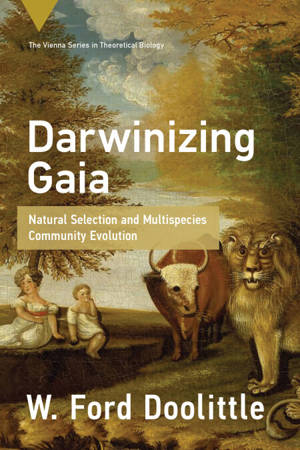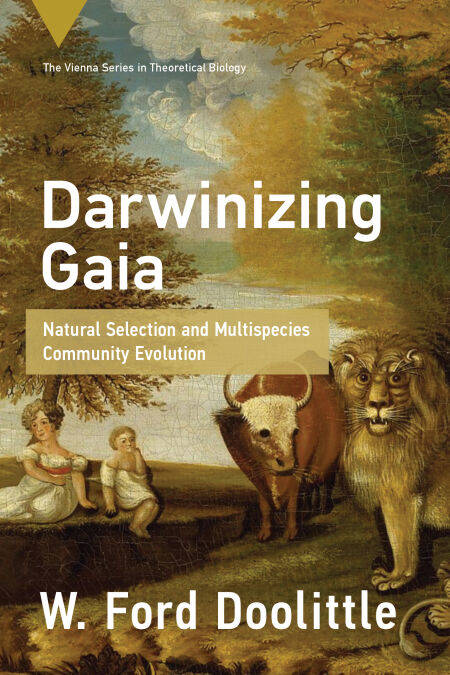
Bedankt voor het vertrouwen het afgelopen jaar! Om jou te bedanken bieden we GRATIS verzending (in België) aan op alles gedurende de hele maand januari.
- Afhalen na 1 uur in een winkel met voorraad
- In januari gratis thuislevering in België
- Ruim aanbod met 7 miljoen producten
Bedankt voor het vertrouwen het afgelopen jaar! Om jou te bedanken bieden we GRATIS verzending (in België) aan op alles gedurende de hele maand januari.
- Afhalen na 1 uur in een winkel met voorraad
- In januari gratis thuislevering in België
- Ruim aanbod met 7 miljoen producten
Zoeken
€ 44,35
+ 44 punten
Uitvoering
Omschrijving
A reinterpretation of James Lovelock’s Gaia Hypothesis through the lens of Darwinian natural selection and multispecies community evolution.
First conceived in the 1970s, James Lovelock’s Gaia Hypothesis proposed that living organisms developed in tandem with their inorganic surroundings, forming a complex, self-regulating system. Today, most evolutionary biologists consider the theory problematic. In Darwinizing Gaia, W. Ford Doolittle, one of evolutionary and molecular biology’s most prestigious thinkers, reformulates what evolution by natural selection is while legitimizing the controversial Gaia Hypothesis. As the first book attempting to reconcile Gaia with Darwinian thinking, and the first on persistence-based evolution, Doolittle’s clear, innovative position broadens evolutionary theory by offering potential remedies for Gaia’s theoretical challenges.
Unquestionably, the current “polycrisis” is the most complex that Homo sapiens has ever faced, and this book can help overcome the widespread belief that evolutionary biologists don’t believe Lovelock. Written in the tradition of Richard Dawkins’s The Selfish Gene, Darwinizing Gaia will appeal to students, evolutionary scientists, philosophers, and microbiologists, as well as environmentalists seeking to understand the Earth as a system, at a time when climate change has drawn our planet’s structure and function into sharp relief.
First conceived in the 1970s, James Lovelock’s Gaia Hypothesis proposed that living organisms developed in tandem with their inorganic surroundings, forming a complex, self-regulating system. Today, most evolutionary biologists consider the theory problematic. In Darwinizing Gaia, W. Ford Doolittle, one of evolutionary and molecular biology’s most prestigious thinkers, reformulates what evolution by natural selection is while legitimizing the controversial Gaia Hypothesis. As the first book attempting to reconcile Gaia with Darwinian thinking, and the first on persistence-based evolution, Doolittle’s clear, innovative position broadens evolutionary theory by offering potential remedies for Gaia’s theoretical challenges.
Unquestionably, the current “polycrisis” is the most complex that Homo sapiens has ever faced, and this book can help overcome the widespread belief that evolutionary biologists don’t believe Lovelock. Written in the tradition of Richard Dawkins’s The Selfish Gene, Darwinizing Gaia will appeal to students, evolutionary scientists, philosophers, and microbiologists, as well as environmentalists seeking to understand the Earth as a system, at a time when climate change has drawn our planet’s structure and function into sharp relief.
Specificaties
Betrokkenen
- Auteur(s):
- Uitgeverij:
Inhoud
- Aantal bladzijden:
- 272
- Taal:
- Engels
- Reeks:
Eigenschappen
- Productcode (EAN):
- 9780262380621
- Verschijningsdatum:
- 2/12/2024
- Uitvoering:
- E-book
- Beveiligd met:
- Adobe DRM
- Formaat:
- ePub

Alleen bij Standaard Boekhandel
+ 44 punten op je klantenkaart van Standaard Boekhandel
Beoordelingen
We publiceren alleen reviews die voldoen aan de voorwaarden voor reviews. Bekijk onze voorwaarden voor reviews.









